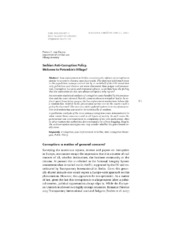Serbian Anti-Corruption Policy. Welcome to Potemkin’s Village?
Anti-korupcijska politika u Srbiji – dobrodošli u Potemkinova sela?
Апстракт
Law enforcement in Serbia concerning the offence of corruption is similar to a camera obscura: opacity prevails. This does not instil much trust in the population: surveys carried out by or on behalf of the UN reveal that only politicians and doctors are more distrusted than judges and prosecutors. Corruption is a very underreported offence, as victims have the feeling that the authorities do not care about corruption: why report?
An extensive statistical analysis of corruption cases handled by the prosecution and the court showed that the camera obscura metaphor had to be refined: apart from being opaque, the law enforcement institutions behave like a random box. Neither in the prosecution service nor in the courts could a policy be discerned. The outcome of the judicial system in terms of prosecution and sentencing appeared to be statistically at random.
A qualitative analysis of the most serious corruption cases demonstrated to what extent these cases occurred in all layers of soc...iety. In such cases the government was non-responsive to complaints of its own institutions. Also in other matters the authorities demonstrated a lot of foot dragging. Despite the anti-corruption strategies one may wonder whether the government really cares.
Кључне речи:
korupcija / corruption / zakoni / law enforcement in Serbia / anti-corruption strategies / strategije za borbu protiv korupcije / public policy / javne politike / SrbijaИзвор:
Filozofija i društvo/Philosophy and Society, 2013, 81-118Институција/група
IFDTTY - JOUR AU - van Duyne, Petrus C. PY - 2013 UR - http://rifdt.instifdt.bg.ac.rs/123456789/909 AB - Law enforcement in Serbia concerning the offence of corruption is similar to a camera obscura: opacity prevails. This does not instil much trust in the population: surveys carried out by or on behalf of the UN reveal that only politicians and doctors are more distrusted than judges and prosecutors. Corruption is a very underreported offence, as victims have the feeling that the authorities do not care about corruption: why report? An extensive statistical analysis of corruption cases handled by the prosecution and the court showed that the camera obscura metaphor had to be refined: apart from being opaque, the law enforcement institutions behave like a random box. Neither in the prosecution service nor in the courts could a policy be discerned. The outcome of the judicial system in terms of prosecution and sentencing appeared to be statistically at random. A qualitative analysis of the most serious corruption cases demonstrated to what extent these cases occurred in all layers of society. In such cases the government was non-responsive to complaints of its own institutions. Also in other matters the authorities demonstrated a lot of foot dragging. Despite the anti-corruption strategies one may wonder whether the government really cares. T2 - Filozofija i društvo/Philosophy and Society T1 - Serbian Anti-Corruption Policy. Welcome to Potemkin’s Village? T1 - Anti-korupcijska politika u Srbiji – dobrodošli u Potemkinova sela? SP - 81 EP - 118 DO - 10.2298/FID1301081V ER -
@article{
editor = "Jovanov, Rastko",
author = "van Duyne, Petrus C.",
year = "2013",
abstract = "Law enforcement in Serbia concerning the offence of corruption is similar to a camera obscura: opacity prevails. This does not instil much trust in the population: surveys carried out by or on behalf of the UN reveal that only politicians and doctors are more distrusted than judges and prosecutors. Corruption is a very underreported offence, as victims have the feeling that the authorities do not care about corruption: why report?
An extensive statistical analysis of corruption cases handled by the prosecution and the court showed that the camera obscura metaphor had to be refined: apart from being opaque, the law enforcement institutions behave like a random box. Neither in the prosecution service nor in the courts could a policy be discerned. The outcome of the judicial system in terms of prosecution and sentencing appeared to be statistically at random.
A qualitative analysis of the most serious corruption cases demonstrated to what extent these cases occurred in all layers of society. In such cases the government was non-responsive to complaints of its own institutions. Also in other matters the authorities demonstrated a lot of foot dragging. Despite the anti-corruption strategies one may wonder whether the government really cares.",
journal = "Filozofija i društvo/Philosophy and Society",
title = "Serbian Anti-Corruption Policy. Welcome to Potemkin’s Village?, Anti-korupcijska politika u Srbiji – dobrodošli u Potemkinova sela?",
pages = "81-118",
doi = "10.2298/FID1301081V"
}
Jovanov, R.,& van Duyne, P. C.. (2013). Serbian Anti-Corruption Policy. Welcome to Potemkin’s Village?. in Filozofija i društvo/Philosophy and Society, 81-118. https://doi.org/10.2298/FID1301081V
Jovanov R, van Duyne PC. Serbian Anti-Corruption Policy. Welcome to Potemkin’s Village?. in Filozofija i društvo/Philosophy and Society. 2013;:81-118. doi:10.2298/FID1301081V .
Jovanov, Rastko, van Duyne, Petrus C., "Serbian Anti-Corruption Policy. Welcome to Potemkin’s Village?" in Filozofija i društvo/Philosophy and Society (2013):81-118, https://doi.org/10.2298/FID1301081V . .



